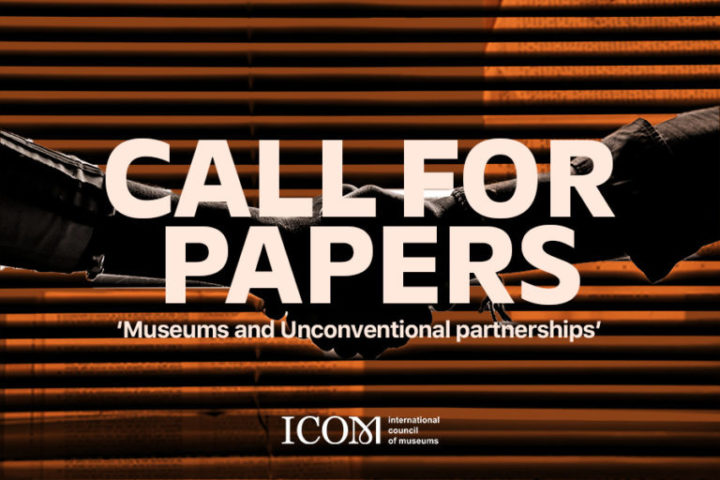
Vol. 76 Nº 301 – 302 « Museums and Unconventional partnerships »
ICOM is preparing an issue of Museum International on the theme of Museums and Unconventional partnerships (Vol. 76 Nº 301 – 302). All proposals submitted will be assessed for suitability, and if chosen, the subsequent articles will go through a double-blind peer review process. The issue is expected to be published, in collaboration with Taylor&Francis/Routledge, end 2024 / beginning 2025.
Deadline: 22 March 2024
In the wake of the global financial crisis of 2008 and the COVID-19 pandemic, museums around the world have struggled to achieve economic stability. Over the past decade and a half many museums have been forced to shut down, while others have been compelled to cut back on staff, reduce working hours and curtail their services in order to stay afloat. This trend has had a profound impact on the cultural landscape of many cities and communities around the world. Conventional methods of funding, such as government subsidies, donations, sponsorships, ticketing and visitors’ spending in museum facilities, have not been sufficient to secure the future. As a result, museums have been forced to find innovative ways to become financially sustainable and ensure their long-term survival.
MUSEUMS AND UNCONVENTIONAL PARTNERSHIPS
Museums have been exploring new frontiers by leveraging the potential of their products and services and expanding their partnerships into non-conventional areas. They have been looking beyond their conventional funding sources, expanding their services and exploring new partnerships, in a bid to diversify their revenue streams and stay afloat in an increasingly competitive environment. At the same time, museums must preserve their principles as not-for-profit institutions in the service of society, as stated in the ICOM museum definition. It is therefore essential to also consider the ethical issues and challenges raised by some partnerships.
We are interested in receiving a diverse range of submissions that can provide valuable insight into unconventional and unfamiliar partnerships: ones that might help expand the profile of museums as economically viable and financially sustainable entities. We also welcome contributions that reflect on the challenges, successes, limitations and failures of such partnerships, and on the overall financial concerns faced by museums today and potential solutions.
We welcome contributions that address the following non-exhaustive list of topics:
- Partnerships between museums and brands (retail industry, product lines and licensing, food and beverage industry, entertainment industry, heavy industry)
- Museums as operators of other museums and cultural facilities
- The economic and financial factors that drive unconventional partnerships
- New forms of fundraising and philanthropy
- Successes and limitations of such partnerships
- Ethical concerns over partnerships
- Partnerships between museums and the hospitality industry
- Museums and the healthcare industry (hospitals and healthcare providers)
- The intersection of museums and real estate development (mixed-use real estate; or museums as real estate managers, consultants, and advisors)
- The potential of museums in the IPs and licensing industry, either as creators of new IPs or as providers of services and products
- The role that museums can play in the communication industry; the direct and indirect value of museum branding, social media content, advertising and other promotional materials
Submission process
Abstracts of between 250 and 300 words, written in English, French or Spanish, should be submitted for selection to publications@icom.museum in a Word (.doc) document (if you do not receive confirmation of receipt within 2 weeks, it is possible that your e-mail did not reach us – do not hesitate to write to us again).
Contributions will be on a voluntary basis.
The following information should be included with the abstract:
- Title of submitted paper
- Name(s) of author(s)
- Professional background
The abstract submission deadline is 22 March 2024.
The abstracts received will be examined on a blind review basis by a panel of experts on the topic.
Museum International is published in English. However, proposals in the other two official languages of ICOM (French and Spanish) will also be considered. If your abstract is selected, we will provide guidelines for your full article, and you’ll have approximately two months to complete it. You may also submit your full article in either English, French or Spanish.
Abstract structure for Museum International articles:
An abstract is a summary of the journal manuscript.
It should be no longer than 250-300 words (excluding selected references) and provide a succinct overview of the article. Please send your abstract in a word document. The abstract should be read as a standalone document and the document should not contain images or footnotes.
The abstract should read as a standalone document.
Abstracts sent to Museum International should include the following sections (not necessarily presented in this way, but all elements need to be included):
1/Introduction: one or two short sentences to describe the overall topic dealt with in the article and provides background to the study.
2/Research question(s)/Critical issue(s): explains the key research question or critical issue, by stating the problem addressed. It should also highlight the gap in existing research on the topic.
3/Innovation: explains the approach to the research question/issue, and the new perspective adopted.
4/Methodology: explains how the research was carried out (e.g. case studies, interviews, etc.) or the means used to address the critical issue.
5/Conclusion: outlines the impact of the research or the outcome of addressing the critical issue, and why the findings/outcomes are important.
6/Selected references: a selection of the references that will be cited in the article (only your main sources).
7/Keywords (maximum of 5).
